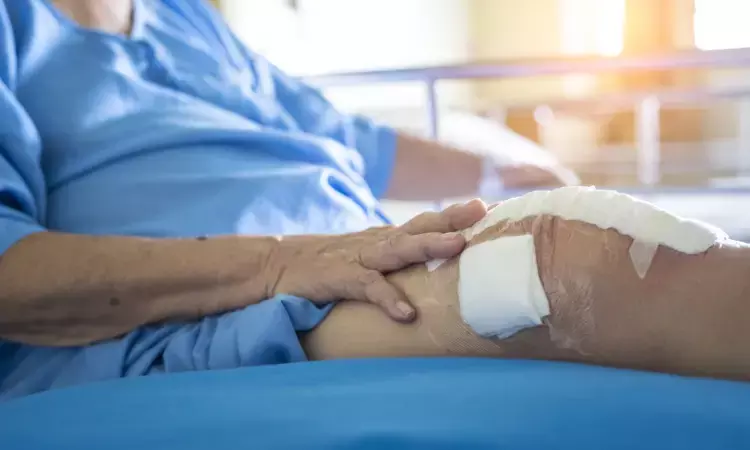- Home
- Medical news & Guidelines
- Anesthesiology
- Cardiology and CTVS
- Critical Care
- Dentistry
- Dermatology
- Diabetes and Endocrinology
- ENT
- Gastroenterology
- Medicine
- Nephrology
- Neurology
- Obstretics-Gynaecology
- Oncology
- Ophthalmology
- Orthopaedics
- Pediatrics-Neonatology
- Psychiatry
- Pulmonology
- Radiology
- Surgery
- Urology
- Laboratory Medicine
- Diet
- Nursing
- Paramedical
- Physiotherapy
- Health news
- Fact Check
- Bone Health Fact Check
- Brain Health Fact Check
- Cancer Related Fact Check
- Child Care Fact Check
- Dental and oral health fact check
- Diabetes and metabolic health fact check
- Diet and Nutrition Fact Check
- Eye and ENT Care Fact Check
- Fitness fact check
- Gut health fact check
- Heart health fact check
- Kidney health fact check
- Medical education fact check
- Men's health fact check
- Respiratory fact check
- Skin and hair care fact check
- Vaccine and Immunization fact check
- Women's health fact check
- AYUSH
- State News
- Andaman and Nicobar Islands
- Andhra Pradesh
- Arunachal Pradesh
- Assam
- Bihar
- Chandigarh
- Chattisgarh
- Dadra and Nagar Haveli
- Daman and Diu
- Delhi
- Goa
- Gujarat
- Haryana
- Himachal Pradesh
- Jammu & Kashmir
- Jharkhand
- Karnataka
- Kerala
- Ladakh
- Lakshadweep
- Madhya Pradesh
- Maharashtra
- Manipur
- Meghalaya
- Mizoram
- Nagaland
- Odisha
- Puducherry
- Punjab
- Rajasthan
- Sikkim
- Tamil Nadu
- Telangana
- Tripura
- Uttar Pradesh
- Uttrakhand
- West Bengal
- Medical Education
- Industry
Pain control after TKA better with liposomal bupivacaine compared to conventional bupivacaine: study

Total knee arthroplasty (TKA) is a commonly performed procedure to alleviate pain and improve functional limitations caused by end-stage joint damage. Effective management of postoperative pain following TKA is crucial to the prevention of complications and enhancement of recovery. Adductor canal blocks (ACB) with conventional bupivacaine (CB) provide adequate analgesia after TKA, but carry a risk of rebound pain following block resolution. Liposomal bupivacaine (LB) is an extended-release local anesthetic that can provide up to 72 h of pain relief.
Quaye et al conducted a study to compare postoperative outcomes between ACBs using LB and CB after TKA. the study has been published in “arthroplasty journal.”
This single institution, prospective, randomized, clinical trial enrolled patients scheduled for TKA. Participants were randomized to receive ACB with either LB or CB. Pain scores up to 72 h postoperatively were assessed as the primary outcome. Opioid consumption and length of stay were evaluated as secondary outcomes. Results A total of 80 patients were enrolled. Demographic and clinical characteristics were similar between the two groups.
Key findings of the study were:
• A total of 80 patients (40 in each arm) were enrolled, of whom 66 (82%) completed the study with no protocol deviations.
• LB group showed significantly lower cumulative opioid use during the 72 h evaluated (P=0.016).
• There were no differences in pain scores or length of stay between the groups.
The authors commented that - The findings from our own randomized controlled trial provide additional evidence that postoperative blocks using LB in ACBs may not effectively reduce pain after surgery. However, they do support the notion that LB has a positive impact on reducing postoperative opioid consumption, indicating a potential benefit in this aspect of patient care. Future studies are needed to investigate the effectiveness of LB for specific procedural types and to explore potential neuro-anatomical differences that may help explain the inconsistencies in its reported effectiveness. In conclusion, we found that using LB in an ACB after TKA led to decreased opioid consumption up to 72 h following surgery. These results add to the existing literature regarding the benefits of LB and may inform the current practice of the of-label use of LB after TKA.
Further reading:
A prospective, randomized trial of liposomal bupivacaine compared to conventional bupivacaine on pain control and postoperative opioid use in adults receiving adductor canal blocks for total knee arthroplasty Quaye et al. Arthroplasty (2024) 6:6 https://doi.org/10.1186/s42836-023-00226-y
MBBS, Dip. Ortho, DNB ortho, MNAMS
Dr Supreeth D R (MBBS, Dip. Ortho, DNB ortho, MNAMS) is a practicing orthopedician with interest in medical research and publishing articles. He completed MBBS from mysore medical college, dip ortho from Trivandrum medical college and sec. DNB from Manipal Hospital, Bengaluru. He has expirence of 7years in the field of orthopedics. He has presented scientific papers & posters in various state, national and international conferences. His interest in writing articles lead the way to join medical dialogues. He can be contacted at editorial@medicaldialogues.in.
Dr Kamal Kant Kohli-MBBS, DTCD- a chest specialist with more than 30 years of practice and a flair for writing clinical articles, Dr Kamal Kant Kohli joined Medical Dialogues as a Chief Editor of Medical News. Besides writing articles, as an editor, he proofreads and verifies all the medical content published on Medical Dialogues including those coming from journals, studies,medical conferences,guidelines etc. Email: drkohli@medicaldialogues.in. Contact no. 011-43720751


